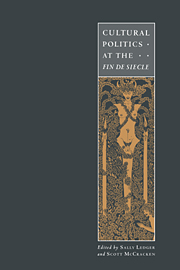Book contents
- Frontmatter
- Contents
- List of illustrations
- Notes on contributors
- Acknowledgements
- Introduction
- 1 The flight to the real
- 2 The New Woman and the crisis of Victorianism
- 3 Empire, ‘race’ and feminism at the fin de siècle: the work of George Egerton and Olive Schreiner
- 4 W. B. Yeats and Irish cultural politics in the 1890s
- 5 The double lives of man: narration and identification in late nineteenth-century representations of ec-centric masculinities
- 6 Henry James and the spectacle of loss: psychoanalytic metaphysics
- 7 ‘A very curious construction’: masculinity and the poetry of A. E. Housman and Oscar Wilde
- 8 The Pilgrims of Hope: William Morris and the dialectic of romanticism
- 9 Urban utopias: socialism, religion and the city, 1880 to 1900
- 10 Vampires and the empire: fears and fictions of the 1890s
- 11 Utopia, Limited: nationalism, empire and parody in the comic operas of Gilbert and Sullivan
- 12 Technologies of monstrosity: Bram Stoker's Dracula
- 13 Postmodernism, a Chance to reread?
- 14 Is market society the fin of history?
- Select bibliography
- Index
10 - Vampires and the empire: fears and fictions of the 1890s
Published online by Cambridge University Press: 29 September 2009
- Frontmatter
- Contents
- List of illustrations
- Notes on contributors
- Acknowledgements
- Introduction
- 1 The flight to the real
- 2 The New Woman and the crisis of Victorianism
- 3 Empire, ‘race’ and feminism at the fin de siècle: the work of George Egerton and Olive Schreiner
- 4 W. B. Yeats and Irish cultural politics in the 1890s
- 5 The double lives of man: narration and identification in late nineteenth-century representations of ec-centric masculinities
- 6 Henry James and the spectacle of loss: psychoanalytic metaphysics
- 7 ‘A very curious construction’: masculinity and the poetry of A. E. Housman and Oscar Wilde
- 8 The Pilgrims of Hope: William Morris and the dialectic of romanticism
- 9 Urban utopias: socialism, religion and the city, 1880 to 1900
- 10 Vampires and the empire: fears and fictions of the 1890s
- 11 Utopia, Limited: nationalism, empire and parody in the comic operas of Gilbert and Sullivan
- 12 Technologies of monstrosity: Bram Stoker's Dracula
- 13 Postmodernism, a Chance to reread?
- 14 Is market society the fin of history?
- Select bibliography
- Index
Summary
And Empire after Empire, at their height
Of sway, have felt this boding sense come on;
Have felt their huge frames not constructed right,
And drooped, and slowly died upon their throne.
(Matthew Arnold, ‘Revolutions’)The closing decades of the nineteenth century exhibit some significant manifestations of that modern myth – the vampire. The very existence of a modern myth is something of a curiosity as it appears to defy the kinds of explanations usually offered in terms of ‘mankind's deepest fears’ and the eternal and universal nature of those fears, and rather to imply a concentration of culturally specific horrors. As Chris Baldick writes of that other enduring monster, Frankenstein's creation:
Such a thing should not exist, according to the most influential accounts of what ‘myth’ is… Modern myths are marginalized by rational discourses, they do not command the same kind of assent as ‘primitive’ myths; their status bears, in short, the scars and handicaps imposed upon it by successive cultural transformations.
The cultural transformations of the vampire that take place during the course of the nineteenth century are closely linked to several developing discourses of the period, principally gender, disease and the decline of the imperial (that is to say, British) race. These in turn are interlinked in the notion of degeneration that reaches a highly developed stage in the 1890s, providing the precursor to Edwardian legislation designed to protect the national stock.
- Type
- Chapter
- Information
- Cultural Politics at the Fin de Siècle , pp. 202 - 220Publisher: Cambridge University PressPrint publication year: 1995
- 5
- Cited by



